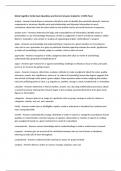QCAA Cognitive Verbs Exam Questions and Correct Answers Graded A+ ( 100% Pass)
analyse - Answers break down or examine critically in order to identify the essentials elements, features,
components or structure; identify parts and relationships and interpret information to reach
conclusions; determine how the parts relate to one another and to an overall structure or purpose;
analyse error - Answers determine the logic and reasonableness of information; identify errors in
presentation or use of knowledge (Marzano); similar to 'judgments in terms of internal evidence' within
Bloom's 'evaluation'; also similar to 'analysis of organising principles' within Bloom's 'analysis'
apply - Answers use knowledge and understanding in response to a given situation or circumstance;
carry out or use a procedure in a given or particular situation appraise evaluate the worth, significance
or status of (something); evaluate, judge or consider a text or piece of work
appreciate - Answers recognise or make a judgment about the value or worth of (something);
understand fully; grasp the full implications of
argue - Answers give reasons for or against something; challenge or debate an issue or idea; persuade,
prove or try to prove by giving reasons
assess - Answers measure, determine, evaluate, estimate or make a judgment about the value, quality,
outcomes, results, size, significance, nature of, or extent of (something) assess the degree suggests that
two schools of thought exist about a given subject; these questions often involve weighing the relative
merit of conflicting points of view, e.g. negative vs. positive, strong vs. weak, fundamental vs. immediate
calculate - Answers determine or find (a number, answer, etc.) by using mathematical processes; obtain
a numerical answer showing the relevant stages in the working; ascertain/determine from given facts,
figures or information
categorise - Answers place in or assign to a particular class or group; arrange or order by classes or
categories; classify, sort out, sort, separate
clarify - Answers make clear or intelligible; explain; make (a statement or situation) less confused and
more comprehensible
classify - Answers systematically arrange, distribute or order in classes or categories according to shared
qualities or characteristics comment express an opinion, observation or reaction in speech or writing;
give a judgment based on a given statement or result of a calculation
communicate - Answers convey knowledge and/or understandings to others; make known; transmit
compare - Answers give an account of the similarities between two (or more) items or situations,
referring to both (all) of them throughout
comprehend - Answers understand the meaning or nature of; grasp mentally
conduct - Answers direct in action or course; manage; organise; carry out
, consider - Answers think deliberately or carefully about (something), typically before making a decision;
take (something) into account when making a judgment; view attentively or scrutinise; reflect on
construct - Answers create or put together (e.g. an argument) by systematically arranging ideas or items
display information in a diagrammatic or logical form make; build
contrast - Answers display recognition of differences by deliberate juxtaposition of contrary elements;
show how things are different or opposite; give an account of the differences between two (or more)
items or situations, referring to both (all) of them throughout
create - Answers bring (something) into being or existence; produce or evolve from one's own thought
or imagination; reorganise or put elements together into a new pattern or structure or to form a
coherent or functional whole
critique - Answers review critically; evaluate (a theory or practice) in a detailed and analytical way
decide - Answers come or bring to a resolution as a result of consideration; make a choice from a
number of alternatives, a term commonly used in decision making, a process within Marzano's
knowledge utilisation level, and consistent with an understanding of 'evaluate'
deduce - Answers reach a conclusion that is necessarily true, provided a given set of assumptions is true;
arrive at, reach or draw a logical conclusion from reasoning and the information given (from something
known or assumed)
define - Answers give the precise meaning of a word, phrase, concept or physical quantity; state
meaning and identify or describe basic/essentials qualities; explain
demonstrate - Answers prove or make clear by argument, reasoning or evidence, illustrating with
examples or practical application; clearly and deliberately show (by example); give a practical exhibition
as an explanation
derive - Answers arrive at by reasoning; manipulate a mathematical relationship to give a new equation
or relationship
describe - Answers give a detailed account (written or spoken) of a situation, event, pattern or process,
or of the characteristics or features (of something)
design - Answers produce a plan, simulation, model, project etc; plan and evaluate the construction of a
product or process plan or fashion artistically or skilfully; form or conceive in the mind
determine - Answers establish, conclude or ascertain definitely after consideration, observation,
investigation or calculation; obtain the only possible answer; decide or come to a resolution
develop - Answers elaborate, expand or enlarge in detail; add detail and fullness to cause to become
more complex or intricate
devise - Answers think out; plan; contrive; invent; create




